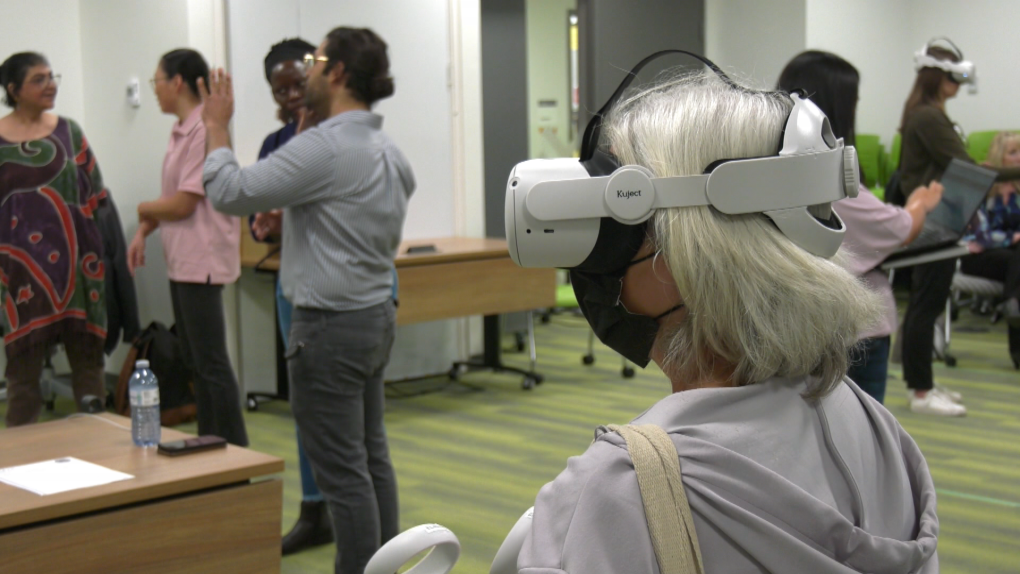New program in Edmonton uses VR to help neurodivergent people navigate the workplace
 Virtual reality scenarios will help employers and job seekers practice navigating workplace scenarios in a low-risk setting. (Evan Klippenstein/CTV News Edmonton)
Virtual reality scenarios will help employers and job seekers practice navigating workplace scenarios in a low-risk setting. (Evan Klippenstein/CTV News Edmonton)
A new program at NorQuest College is using virtual reality to try and get more neurodiverse people into the workforce.
The VR soft skills training program uses headsets and simulated scenarios to help neurodivergent people practice their workplace and communication skills.
It was developed in conjunction with the Government of Alberta with funding from the Workforce Development Strategies Grant.
Scenarios include understanding workplace etiquette, asking for help, meeting new colleagues and undergoing performance reviews. Training scenarios run between around three and 15 minutes.
Gail Kesslar, the project manager, said virtual reality offers a low-stress environment where neurodivergent people can apply and refine their skills without the social pressure of doing it in person.
"It gives them an opportunity [to] practice some of those job interview skills without having to do it in a real live job interview session where the pressure is higher," she said. "The more that they can practice these skills, the more they can learn, the better they will be at it when they come to an actual job interview."
The program includes two scenarios for employers designed to help them address expectations or bias they might have when hiring or working with an autistic person.
Simulations include discussing support and accommodations with staff and how to communicate with employees in challenging workplace scenarios.
"What we do is we give them education about why that particular behavior may occur or may not, we give them communication tools to help them understand how best to navigate the situation and we give them the language of how best to speak to the individual about that," Kesslar said.
Practicing communication is important for employers and their prospective employees, Kesslar said, because missteps can hurt people's confidence and affect their ability to work in an organization.
"So this gives a safer experience that allows [employers] to practice those soft skills, to learn about those soft skills without any human interaction that can cause damage," she added.
The training is free and Kesslar said the headset and scenarios will be available for post-secondaries around Alberta.
CTVNews.ca Top Stories

Car flies into B.C. backyard, lands upside down
A driver suffered only minor injuries after going airborne in a residential neighbourhood in Maple Ridge, B.C., on Friday, the car eventually landing on its roof in someone’s backyard.
Donald Trump, Elon Musk attend rally at same Pennsylvania grounds where gunman tried to assassinate Trump
Donald Trump returned on Saturday to the Pennsylvania fairgrounds where he was nearly assassinated in July, holding a sprawling rally with thousands of supporters in a critical swing state Trump hopes to return to his column in November's election.
Tax rebate: Canadians with low to modest incomes to receive payment
Canadians who are eligible for a GST/HST tax credit can expect their final payment of the year on Friday.
'No one has $70,000 dollars lying around': Toronto condo owners facing massive special assessment
The owners of a North York condominium say they are facing a $70,000 special assessment to fix their building's parking garage. '$70,000 is a lot of money. It makes me very nervous and stressed out of nowhere for this huge debt to come in,' said Ligeng Guo.
Police ID mom, daughter killed in Old Montreal; video shows person break into building before fatal fire
Police released the identities of the mother and daughter who were killed after a fire tore through a 160-year-old building in Old Montreal on Friday.
Frequent drinking of fizzy beverages and fruit juice are linked to an increased risk of stroke: research
New data raises questions about the drinks people consume and the potential risks associated with them, according to researchers at Galway University in Ireland, in partnership with Hamilton’s McMaster University.
'I screamed in shock and horror': Family faces deadly Vancouver hit-and-run driver during sentencing
The sentencing of the man who pleaded guilty in the deadly hit-and-run in Kitsilano two years ago began on Friday.
Vanderbilt takes down AP poll No. 1 Alabama 40-35 in one of college football's greatest upsets
Vanderbilt takes down AP poll No. 1 Alabama 40-35 in historic college football victory.
Tropical Storm Milton forms in Gulf of Mexico, could intensify as a hurricane threatening Florida
Tropical Storm Milton has formed in the Gulf of Mexico. It is located 220 miles (355 kilometres) north-northeast of Veracruz, Mexico.


































